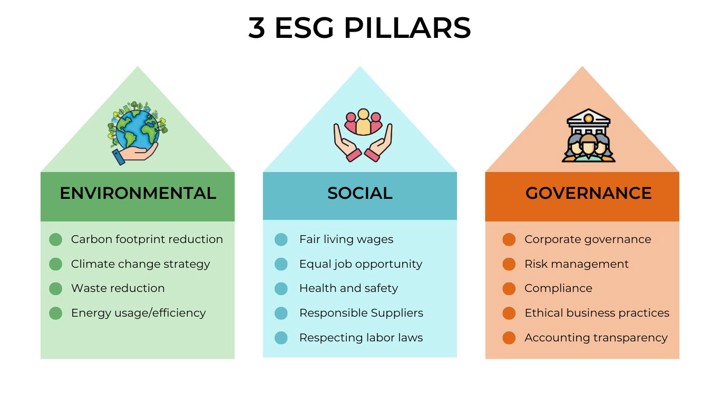In this article, we will explain the background of ESG, why companies in the EU are required to report on ESG activities, as well as provide specific guidance on where to start.
What does ESG mean and why is it important?
ESG is an acronym that stands for Environmental, Social, and Governance factors. The concept comes from a 2004 report titled “Who Cares Wins“, created by the United Nations Global Compact. It is part of a global initiative to make environmental, social, and corporate governance relevant in evaluating a company’s financial performance.
A report by the NYU Stern Center for Sustainable Business and Rockefeller Asset Management found that companies which perform well in Environmental, Social, and Governance (ESG) also tend to have better operational efficiency, stock performance, and lower borrowing costs. They concluded that focusing on ESG can lead to better management and improved financial returns.

What is ESG reporting and why are EU companies required to do it?
The EU has been integrating sustainability into its financial policy. As part of this effort, regulations and directives have been put in place to make reporting on ESG factors mandatory for companies doing business in the EU.
The Corporate Sustainability Reporting Directive (CSRD) is a recent example, put into force in January 2023. It requires all large companies to regularly and transparently publish information about the impacts of their activities on the environment and society, as well as the sustainability risks they may be exposed to.
Overall, the goal of ESG reporting is to show how a company manages its environmental, social, and governance issues, and how these issues affect its financial performance.
The state of ESG reporting in Croatia: a survey on 100 companies
Solvership and Ipsos have done a survey on the implementation of the Corporate Sustainability Reporting Directive (CSRD) in companies doing business in Croatia. The aim of the survey was to determine the current actions that business entities have taken to align with the Directive, the obstacles they encounter, and how many resources (people and time) they need to collect the necessary data.
The survey was conducted on a sample of 100 companies that belong to the segment of medium and large enterprises to which the Directive applies. Here are the key findings:
1. Awareness and familiarity with ESG and CSRD
- Out of 142 companies surveyed, 30% (42 companies) have never heard of ESG, the CSRD, or collected data for ESG reports.
- Only 5% and 3% of respondents are very familiar with the terms ESG and CSRD, respectively.
- 54% of companies have not yet determined what ESG data is needed, nor have they started data collection.
2. Engagement in ESG activities
- Environmental Activities
- Most companies (87% and 85%) focus on waste management and reducing paper consumption.
- Energy and water consumption reduction are also common.
- Lesser engagement in renewable energy use, natural resources protection, biodiversity, and greenhouse gas emission reduction. Only 4% of companies do not implement any mentioned ESG activities.
- Social Activities
- Majority ensure safe, healthy working conditions.
- Over half of the companies donate funds and promote human rights.
- Volunteering in local communities is less common.
- Governance Activities
- Many companies engage in risk management and regulatory compliance.
- Common practices include transparent business activity reporting, ethical business practices, and setting sustainability goals.
3. ESG reporting practices
- Only 13% of surveyed companies have prepared ESG reports, with larger companies being more likely to have done so.
- Data collection for ESG reports is usually done by one person or a small team, taking up to a month, and occurs annually or monthly.
- Internal sources are the most common for ESG data, followed by the internet, suppliers, and service providers.
- None of the 13 companies that have prepared ESG reports provided an example of calculating CO2 emissions.
Based on the results, companies show a significant gap in understanding and implementing ESG data collection and reporting. Many companies don’t understand the specifics of ESG reporting or what data they need to gather.

Where to start with ESG reporting
The first step in ESG reporting is to start thinking about the data you need, the one you have and the ways in which you manage it. Here are three crucial initiatives companies should consider:
Establish functional silos: Creating dedicated teams or departments focused on different aspects of ESG can streamline data collection and management processes. These functional silos ensure that specific data related to environmental, social, and governance factors are accurately collected and managed.
Embed ESG requirements into core processes: Integrating ESG considerations into the heart of business operations ensures that ESG data is collected as a routine part of business activities. This integration makes ESG reporting a seamless part of business processes rather than an afterthought.
Establish a unified system for collecting and managing ESG data: A centralized system for ESG data collection and management is crucial. This unified approach ensures consistency, accuracy, and efficiency in handling ESG data, ultimately enhancing the quality and reliability of ESG reports.

Why implement an ESG data management solution
For companies striving to meet the growing demands of sustainability reporting, an ESG data management solution can work wonders. Here are its main benefits:
A single source of truth
Managing data across the organization is often the biggest challenge in ESG reporting. Having all ESG-related data in a centralized repository makes it easily accessible, which enhances the credibility of the final ESG reports.
Automatic data consolidation
Companies often deal with various data formats and information from multiple departments and external sources. An ESG data management solution that offers automatic data consolidation can greatly simplify the work. It reduces the likelihood of errors that can occur with manual data handling and saves valuable time. This streamlined approach ensures that data is accurately compiled, enhancing the overall quality of ESG reporting.
Scalability
As regulations change and the business grows, handling increased data volume and complexity without losing efficiency becomes crucial. Scalable ESG data management solutions are designed to accommodate growing amounts of data and expanding reporting requirements.
Support for multiple frameworks
ESG reporting involves navigating a variety of reporting frameworks and standards, such as the Global Reporting Initiative (GRI), Sustainability Accounting Standards Board (SASB), and Task Force on Climate-related Financial Disclosures (TCFD). Each framework has specific requirements and focuses.
A comprehensive ESG data management solution should support all these, offering the flexibility to comply with various standards. This is vital for companies that operate globally or in multiple sectors.
Consider a dedicated solution to make ESG reporting easier
Mandated by the EU’s Corporate Sustainability Reporting Directive (CSRD), companies are required to transparently report their environmental and social impacts and governance practices, also known as ESG reporting. Our survey on the state of ESG reporting in Croatia indicates companies already engage in various ESG activities, but there is a disparity between action and reporting.
While engaging in ESG reporting presents some challenges, it can be made easier with strategic management of ESG data through dedicated solutions. This offers a pathway to not only regulatory compliance but also enhanced corporate sustainability and stakeholder trust.
Premier ESG reporting software
Depending on different organizational parameters, there are various options out there. To us in Solvership, Envizi stood out as the best fit for the types of clients we usually work with. From our perspective, Envizi ESG Suite by IBM stands out as the premier ESG reporting software for companies seeking to expedite their sustainability initiatives through data-driven approaches. It comprises applications that facilitate report creation and automate the gathering and consolidation of over 500 data types, supporting a wide range of internationally recognized ESG frameworks.
Additionally, the platform boasts robust visualization features, including customizable dashboards and interactive user interfaces, enhancing the overall user experience for comprehensive and accessible ESG insights.
PREV
Key players in Data Strategy — the essential roles and their functions
NEXT
Mastering complex financial consolidation with IBM Cognos Controller

